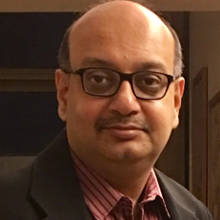[Photo from GE]
Two weeks ago, when GE announced it was selling off Crotonville, its iconic centre for leadership training and learning, it sparked off an interesting debate about the future of corporate universities.
At its peak, especially during the Jack Welch era (1981 to 2001), Crotonville was accorded a preeminent status for churning out a steady stream of highly capable, global leaders who not only helmed GE’s multiple businesses, but later many were among the most sought after CEO picks for a clutch of US corporations.
The top notch faculty at Crotonville, including Noel Tichy, Ram Charan, Vijay Govindrajan, Peter Capelli, to name just a few, and GE’s top leaders, including Welch, Gary Reiner, Bill Conaty, Jeffrey Immelt and Susan Peters, together taught highly curated and sought after custom programmes on leadership to generations of early stage leaders, mid tier and senior managers from all over the world.
For any high performing GE manager, it was not just a privilege to be invited to attend a leadership programme at Crotonville, but an opportunity to engage with the topmost leaders and thought leaders, both formally in the classroom and informally over dinner, switch off from the day to day running of the business to reflect on the future, and also to present to senior leaders and get handpicked for future roles. “Most of all, Crotonville represented a huge commitment from GE’s top leadership that systematic leadership development, talent management and career development made ample business sense and provided significant return on investment. After all, the underlying principle was that leaders helped build culture and culture was in turn shaped by leaders willing to pay it forward,” said Vikram Cardozo, a former senior executive, who worked for 23 years at various roles around the world at GE, which included considerable time spent at Crotonville.
In November 2021, ever since GE decided to carve up its three global businesses—aviation, healthcare and energy—the writing on the wall was already apparent for Crotonville. As its first outsider to be made CEO of GE, Larry Culp may have viewed the economics of running and maintaining an expensive 60 acre campus in upstate New York, with substantial overheads, as a needless expense, especially since he would have had, unlike his predecessors, none of the emotional linkages to GE’s heritage and legacy. “As more and more boards select CEOs from outside, rather than promote from, it starts to raise uncomfortable questions about the return on investment on in-house leadership development,” said D Shivakumar, operating partner, Advent International and a former group president at Aditya Birla Group.
However, Crotonville’s demise does raise several larger questions about how modern day global corporations may be run, how future leaders are likely to be groomed for global careers—and even how corporate cultures could be shaped.
The biggest among them is the short-termism that has gripped corporate America and its obsession with shareholder value creation. That virus has, in turn, percolated down to many markets around the world, including India. Crotonville inspired Four Acres at Unilever UK and Singapore and Gulita at HLL, Tata’s TMTC in Pune, Aditya Birla Group’s Gyanodaya, and many others like SBI, Infosys, L&T, Bharat Petroleum to set up their own versions of corporate universities.
Yet the fact is that a growing number of CEOs view leadership development as an expense that needs to be curbed and are unwilling to underwrite what is clearly a high gestation project.
At one level, there is adequate reason to question such investments. Corporate executive tenures are shortening, corporate longevity itself is dropping alarmingly—and there has been a huge expansion in the leadership development “industry”—with universities, business schools and management consulting firms stepping up to the plate. “There has been an explosion of executive education programmes and lifelong learning. Yet business school faculty tend to be reluctant to customise their learning programmes, unless companies are willing to pay a huge premium,” says Stephanos George Eapen, Blue Ocean practitioner and former academic programme director at CEDEP in France.
That’s exactly why Satish Pradhan, the former group head of HR at the Tata group, would spend an entire evening with Professors Nitin Nohria, Krishna Palepu and Das Narayandas, the three senior faculty members from Harvard, discussing the slate of internal leaders that year, who had been nominated to attend the advanced management programme at TMTC, Pune. “These people planning sessions were an important part of the leadership development process. We would discuss each candidate with the faculty till the wee hours of the morning before the programme started at TMTC,” said Pradhan. That helped significantly tailor learning outcomes to the prevailing business context. These annual premium leadership programmes were in sharp contrast to the routine, “tick-the-box” skill based training programmes that many HR leaders tend to focus on.
At Crotonville, senior leaders were invited to be “leaders in residence”, where they would be available to participants for a range of interactions, ranging from one-on-one sessions, classroom sessions, dinners, fireside chats, etc. Senior leaders were expected to demonstrate that they were “givers” and always be willing to share their wisdom. There were many cases where leaders would fall off the perch, if they were found to repeatedly decline invitations from senior programme curators at Crotonville.
Also, with the growth of emerging markets, the need for a large physical space in the US or Europe has also become somewhat harder to justify. Many global firms have moved learning organisations closer to the businesses in key markets, like GE did for its tech centres in China and India, in the process embracing a more hub and spoke model.
Yet there are two different points of view that merit evaluation.
One, while the US corporate world has been swept up by this wave of transaction-driven cultures, there are those that believe that Asian companies would do well to instead preserve their relationship-based cultures and invest in building leaders for tomorrow. The fact that there is robust demand for GE and Unilever HR leaders across India and China is a signal that there is appetite for long-term thinking.
In fact, in recent times, GE’s performance under Jack Welch has been called into question. In 2022, David Gelles, a New York Times reporter, published a book provocatively titled The Man Who Broke Capitalism: How Jack Welch Gutted the Heartland and Crushed the Soul of Corporate America—and How to Undo His Legacy, which argued how shareholder maximisation had destroyed American society in ways that needed deeper introspection. This reevaluation has also cast a shadow on Crotonville and GE’s much heralded management development model. That chorus has been joined by leaders in India. “Sridhar Vembu at Zoho has been critical of Jack Welch’s financialisation of business and deep cuts in research and development,” said Ramakrishna Velamuri, visiting faculty at the Mahindra School of Management and its former dean. (In January 2022, at Beacon, an ideas festival curated by Founding Fuel in partnership with BITSoM, Vembu shared his perspective on the same theme with Sharad Sharma, co-founder of iSPIRT, a tech think tank, based in Bengaluru.)
Besides, a large corporate university with the pomp and show of a Crotonville or Four Acres may not be entirely necessary. In fact, critics argue that GE could have considered fixing an annual utilisation plan at Crotonville—and encouraged the centre to generate more revenues for the rest of the calendar. It isn’t clear if Culp was presented with that option.
Two, accepting significant leadership churn—and over-relying on lateral hires—can sometimes become a self-fulfilling prophecy. The more you move away from a structured approach to designing careers, the weaker is the glue that binds and sustains corporate cultures.
Many companies routinely nominate some of their best performing leaders to prestigious programmes at Harvard, Wharton, Stanford and the like. However, while it is seen as a huge perk, there is still a question mark about whether they make any real difference to the organisation when the executive comes back to base. Networking with internal leaders fosters collaboration and teamwork at in-house programmes. Given the difference in contexts, that’s seldom universally possible at open programmes, run by business schools or consulting firms.
“At Crotonville, GE found that the concept of “intact teams” working on specific challenges and developing a shared understanding of how to solve it were powerful ways to drive relevance, context and meaning,” said Cardozo.
More often than not, these action learning projects, done in-house, help deliver business results that help pay—and a lot more—for the cost that is incurred for them. However, most firms find it tough to find the right balance between experiential or applied learning and conceptual learning.
Above all, it is about a CEO demonstrating commitment to the process of leadership development. “Ever since Gulita in Worli opened its doors in 1986, that commitment was visible from successive generations of chairmen, for all those of us who went through the paces in the eighties and nineties,” said Shivakumar, also a former Lever senior manager. By the next decade, however, that commitment began to wane, eventually leading to a sale to the Ajay Piramal group in 2012.
In the future, when major corporations think about investing behind culture and values, it remains to be seen how much emphasis they place on leadership development, in general, and on building their own in-house leadership academies.
(A shorter version of this column was published in Business Standard)

